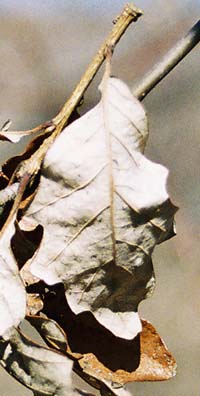
In Lithuanian mythology, the oak is the sacred tree of Perkunas, the god of thunder and lightning. Perkunas is classically masculine, Thor-like. He oversees retribution -- smiting evil-doers -- and fructifying -- striking the dormant earth in spring to wake her, then inseminating her with dew. His representative animals are the bull and the he-goat.
I don't much like Perkunas. He seems like a vile combination of George Bush and Arnold Schwarzenegger. He's a gender cartoon, all terrible swift sword and sexual prerogative. He seems a made-to-order mascot for the religious right, way more so than Jesus. There's nothing turn-the-other-cheek about Perkunas. He's a cinematic, eye for an eye kind of deity with a robust, pre-modern sex life.
But I'm just two generations away from Lithuania, the Old Country. My nationalistic uncle taught me early on that Lithuanian is one of the most ancient languages, quite close to Sanskrit. He taught me that all words have etymologies. He tried to teach me to distinguish red oaks from black oaks from white oaks by leaf shape, but it never stuck. Nonetheless, I've always loved oaks. For the brown and leathery leaves that remain on the branches in the winter and make a fine rattling hissing sound in the wind. For acorns, with their little Jean-Paul Sartre berets. I came out of childhood viewing Lithuania as the pre-lapsarian paradise of my forefathers.
Then I read some modern history. Read about how eagerly Lithuanians collaborated with the Einsatzgruppen genocide; read about the pogroms, the liquidated ghettos, the killing pits in the Ponary forest.
Perkunas' symbol ? The swastika.
Nebelsdottirs (6.6.95)
Old Herr Professor Sigmacht Nebelfrei
once spawned and made himself three pretty daughters --
Großein, Großzwei, Großdrei --
who traveled by themselves to Argleterror,
Bigone, Bigtwo, Bigthree.
They fled across the sparkling Heimat waters.
One was as fair as blissful Saxony
and lusty as a Rhineland tinker's dam.
First she took the fine name Great and then she
called her brooding older sister Grand.
Grand was tall as a hollow Lindenbaum
and swaggered like a hopeless courting ram;
the last was Gross who pined for hearth and home,
through thick and thick and thick and thick and thick.
A sward, a swale, a whistling piny grove
a cottage made of twenty walking sticks,
the sisters were as rich as Deutschland queens,
with crowns of tooth and roots like leather whips
all tangled beneath the cold reluctant green
of shallow grass. But their woods were full of owls,
and black feathers spun and tumbled on the sheen
of their brooks and anthems; their sky blue porcelain bowls
held cheeses ripening to sour and fetid soap.
There were no cellars deep enough, no holes
whose darkness could in them instill the hope
that they could bear to look upon the closest
to them, and not think of dying by the rope.
Yes, Argleterror was a bitter hostess
to dreadful Father Grimm's expatriata
the lovely daughters gross, grosser and grossest.
No comments:
Post a Comment